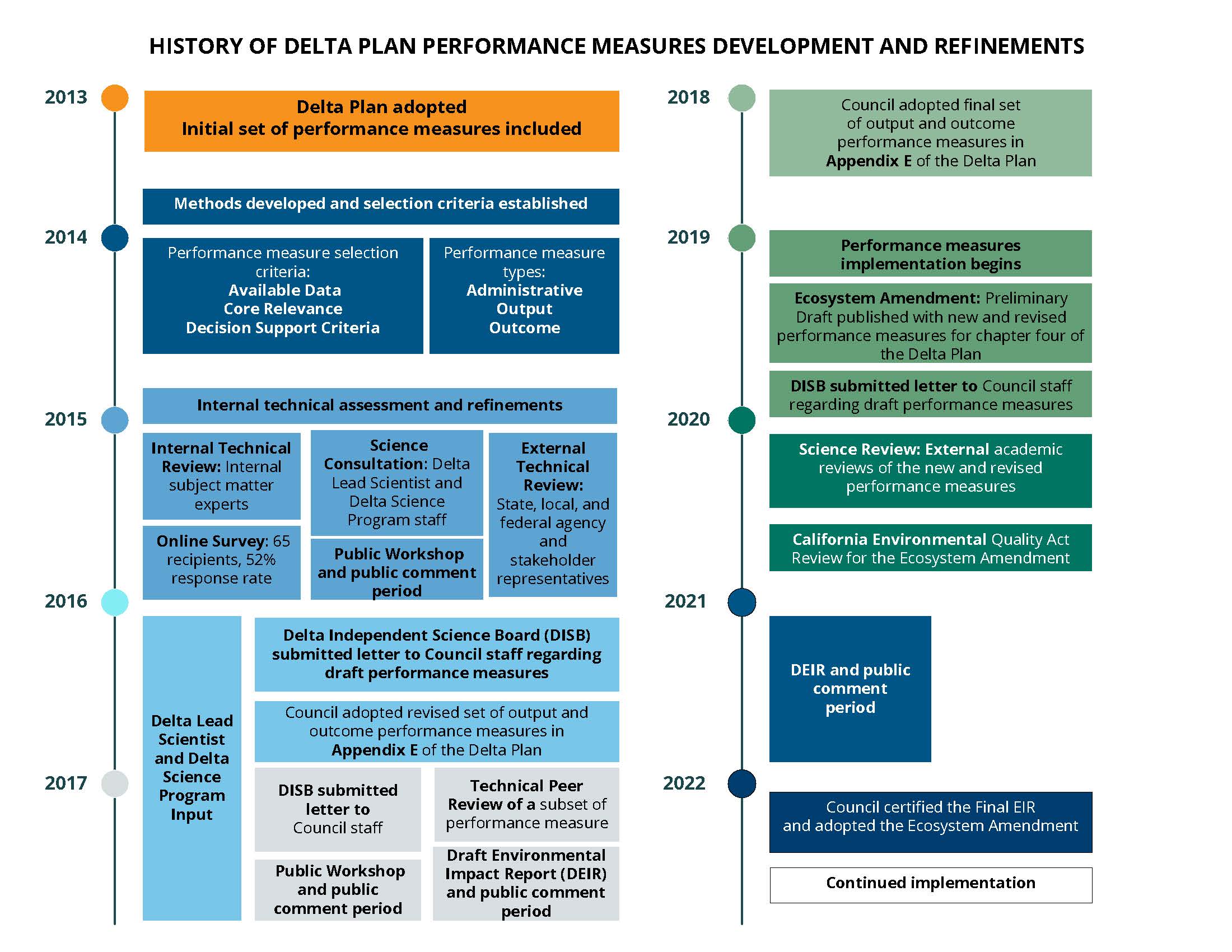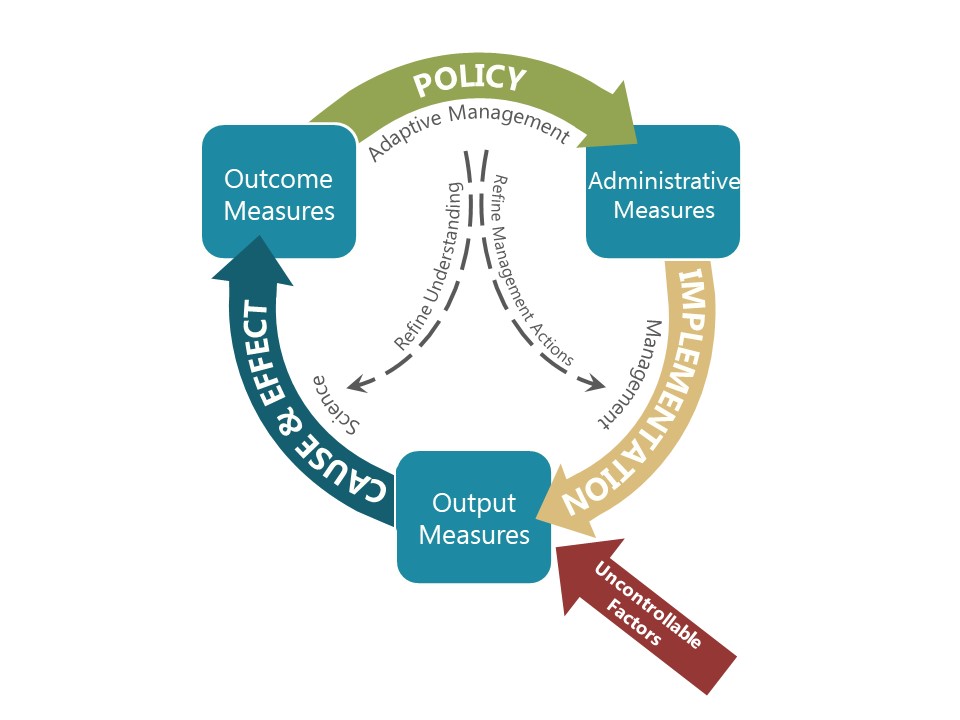This website provides access to performance measures information and data. It tracks and reports on the performance metrics, baselines, and targets for each measure.
Using this website, Delta Plan implementing agencies and interested public can view the status of performance measures and understand the science-based story each measure tells about reaching the coequal goals and managing complexities within the Delta. In addition, a high-level summary of key changes tracked by the performance measures and featured updates are published annually under the "Year in Review" tab on the top navigation bar of the website.
About Performance Measures:
Performance measures are critical to implementing the Delta Plan, which is a comprehensive, long-term management plan for the Sacramento-San Joaquin Delta (Delta) and Suisun Marsh required by the Delta Reform Act of 2009. The Delta Plan was first adopted by the Delta Stewardship Council in 2013 and has been amended seven times since.
See Video about Performance Measures See Performance Measures Guidebook
Delta Plan performance measures allow the Delta Stewardship Council, Delta Plan implementing agencies, stakeholders and the public to track how well the goals and objectives defined in the Delta Plan are being achieved and to detect environmental or administrative changes due to implementation of policies and recommendations in the Delta Plan.
Relying on science and monitoring data, these measurable indicators are based on numeric targets and include dates to achieve the targets as well as baseline conditions against which to evaluate the progress.
Delta Plan performance measures allow the Delta Stewardship Council to integrate science and monitoring results into decision-making, adaptive management, and to track progress towards the coequal goals.
The performance measures were adopted by the Delta Stewardship Council in April 2018. More recently in June of 2022, the Council adopted the revised Chapter 4 of the Delta Plan (Ecosystem Amendment), which includes new and revised performance measures for the ecosystem chapter.
The updated set of performance measures was adopted by the Council in June 2022 as Appendix E of the Delta Plan.
Delta Plan performance measures report the progress in meeting goals and objectives for the Delta and assessments of performance measures contribute to the knowledge about the status of the Delta ecosystem and reliability of statewide water supply.
As a result, the Delta Stewardship Council, the Delta Plan implementing agencies, stakeholders - and the public - can evaluate management actions in both quantitative and qualitative terms.
The performance measures also support government transparency and can be used to enhance collaborations across all managing entities.
Development of performance measures for a complex and large-scale system like the Delta was a multi-year process that involved state, federal and local agencies, scientists and stakeholders. The administrative measures consist of actions contained in the policies and recommendations from the Delta Plan. The output and outcome measures were selected based on ‘measurable’ features that describe important trends and address whether specific actions are producing expected results. Because the output and outcome measures are based on data and available science, leveraging existing data and monitoring efforts was a guiding principle.
Quantitative performance measures were selected using screening criteria. The Delta Stewardship Council developed these measures by gathering available information and science, conducting interviews with Delta scientists and managers, and studying other successful practices and frameworks outside of the Delta. The gathering phase included holding outreach meetings, documenting data needs, developing a data collection methodology, and synthesizing source data and datasets. Screening the initial set of potential measures included these criteria/questions:
- Available data - Is the measure viable, (e.g., feasible, ready for implementation, and supported by available data)?
- Core relevance - Is the measure relevant to management of the system?
- Decision support – Does the measure support the Delta Plan goals?
The Delta Stewardship Council then coordinated technical reviews of the initial set of quantitative performance measures and vetted them through formal outreach processes including online surveys and public workshops to help ensure opinions of partner agencies, subject matter experts, and public stakeholders were considered.
An updated set of performance measures was adopted by the Delta Stewardship Council in June 2022 as Appendix E to the Delta Plan which included additional and revised performance measures to the ecosystem chapter due to the Ecosystem Amendment.

The Delta Plan identifies three types of performance measures: administrative, output, and outcome.
Administrative performance measures describe decisions made by policymakers and managers to finalize plans or approve resources (e.g., funds, personnel, projects) for implementation of a program or group of related programs. The administrative measures are near-term decisions and consist of actions identified by Delta Plan policies and recommendations.
Output performance measures, also known as performance drivers, track results of administrative actions and evaluate factors that may be influencing outcomes. Output performance measures include on-the-ground implementation of management actions such as acres of habitat restored or acre-feet of water released. Outcome measures can also include natural phenomena independent from actions in response to Delta Plan policies and recommendations such as flood, earthquake, or ocean conditions.
Outcome performance measures evaluate system responses to management actions or natural phenomena. Outcome performance measures describe the effects and impacts of management actions upon the system that is being managed. For example, the goal of habitat restoration is to create suitable conditions for native species or ecological processes. Outcome measures are in many cases the hardest to measure and assess, yet they are most relevant to the goals and objectives of the Delta Plan.

